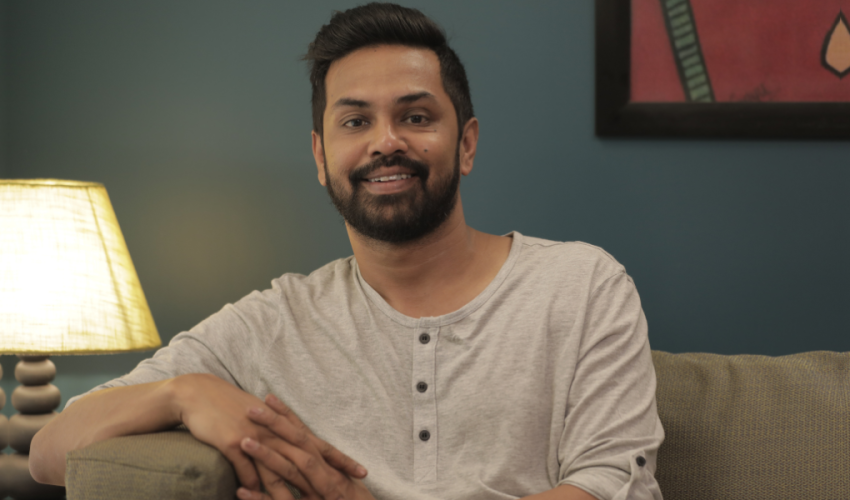From watching arthouse Hindi films on VHS to living in the Chabial House with Mostofa Sarwar Farooki and his gang to finishing scripts on the set of the web series he is making, award-winning writer/actor/director Ashfaque Nipun looks back on a storied adventure
By Faruque Ratul
When did you begin to feel this desire to write and visualize stories?
This was in the mid-eighties to late-eighties. My father was an engineer based in Abu Dhabi. I lived there until Grade two, after which I moved back to Bangladesh and studied and grew up in Chittagong. In the Middle East, the only mode of entertainment available to us was cinema. We used to get a lot of Hindi films on VHS, and action films were in high demand. Us kids loved films starring Amitabh Bachchan and Mithun Chakraborty. My parents preferred “alternative” films featuring Nasiruddin Shah, Smita Patil or Shabana Azmi. They used to watch the works of Shyam Benegal, Govind Nihalani, Sai Paranjpye, or Basu Chatterjee. Now and then we used to watch those alternative films with our parents.
I cannot recall a single action film I watched from that time, but I do remember the films by Shyam Benegal, Govind Nihalani, Sai Paranjpye, or Basu Chatterjee, as they were about realistic family dramas. No matter how older I was getting, the “realistic” films remained imprinted somewhere in my head.
For example, I watched the film Arth, featuring Shabana Azmi and Smita Patil when I was young. I can still remember the scenes.
As I was growing older I was also somehow realizing that there were two kinds of films; one kind was pot-boiler action cinema, and the other kind was arthouse cinema, which now we call “alternative” cinema or realistic cinema. By middle school, I had understood that that the alternative cinema somehow remains in the viewers’ psyche. The pot-boiler commercial cinema does not leave a long-term impression in the mind; when we watch them, we enjoy them temporarily, but they do not have a recall value. So it kind of got established in my mind as to which films were realistic, which have the potential to be timeless, and which films were enjoyed temporarily. This whole journey was on a subconscious level.
I did not have the desire to be a filmmaker while growing up. I first wanted to be a banker. Initially, I had the same dreams just like any other guy from a district outside Dhaka, which was to get a job and earn money.
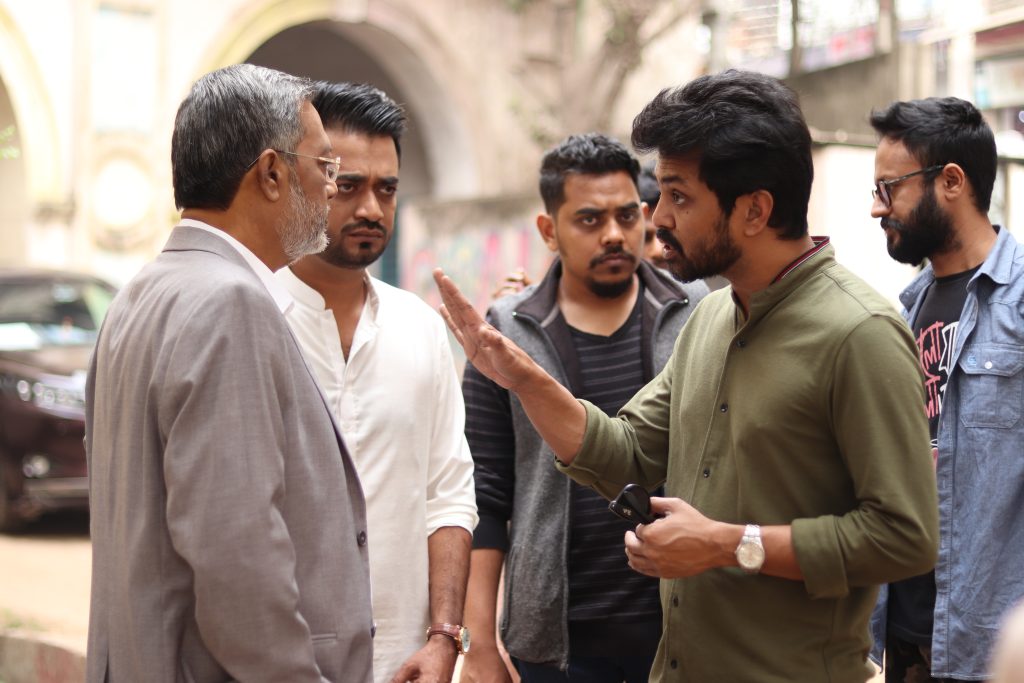
One day while travelling on a tempo I saw this bank employee returning home at 9:30 pm. By then I was already in the first year of Chittagong University as an English major. When I saw that a bank employee is getting home to their family on a tempo at 9:30 pm, I was suddenly hit with an epiphany, which was “This can’t be my life.” If I were to go on the same path as this man, and then would be subjected to return home at 9:30 pm, then what time will I have left just for myself? So that is when the thought of a typical corporate job or jobs that are considered safe was driven from my head. I told myself, “This is not what I want to do.” I do not want this, where my life will turn robotic.
I am not disrespecting those kinds of jobs, but I was feeling that I do not fit into that mould. I wanted to do something different. At that time, I used to watch a lot of films and listen to music. So I decided to be a musician. I bought a guitar and enrolled in classes. I went for a couple of classes, but it was very tiring for me, so it just did not happen. I tried to learn computers, but that did not happen either. However, I kept watching films while I was exploring all those other paths.
I studied at Ispahani Public School and College and Chittagong College before I enrolled in Chittagong University for studying English. At that time, I used to tutor students in batches to sustain my love for watching films. I used to tutor students of all levels, including Intermediate students, in batches till lunch, and then after lunch, I used to home-tutor English medium students. The money I earned from tutoring students is how I was able to buy my computer and rent DVDs to watch a lot of films.
I started watching global cinema, particularly Iranian films, and European films, which were available on DVDs, and which I rented alongside regular commercial Hollywood films. I started watching films by Satyajit Ray. While watching such films, I appreciated their “recall” value, and I was once again struck with the feeling that these films “stay” with you. The action flicks, even those of Hollywood do not “stay” with you. Romantic, action or thriller films do not stay forever in the mind of the viewers. When you watch a Hollywood film, which is a big-budget or big bonanza, or even a big-budget Hindi cinema, you realize automatically that you will not be able to make these films. As these films are not about life.
However, when you watch a film by Satyajit Ray, or by Mrinal Sen, or by Abbas Kiarostami, you start feeling that they are telling your story. You will feel like saying “I also want to tell this story.” This feeling you will not get when you watch a Hollywood action film, which you watch only for entertainment. You know as an audience member that you can never make that film, as it is set in a very unreal world. As a film enthusiast when I was watching all these different kinds of films as a university student by renting DVDs, I got more curious about the craft.
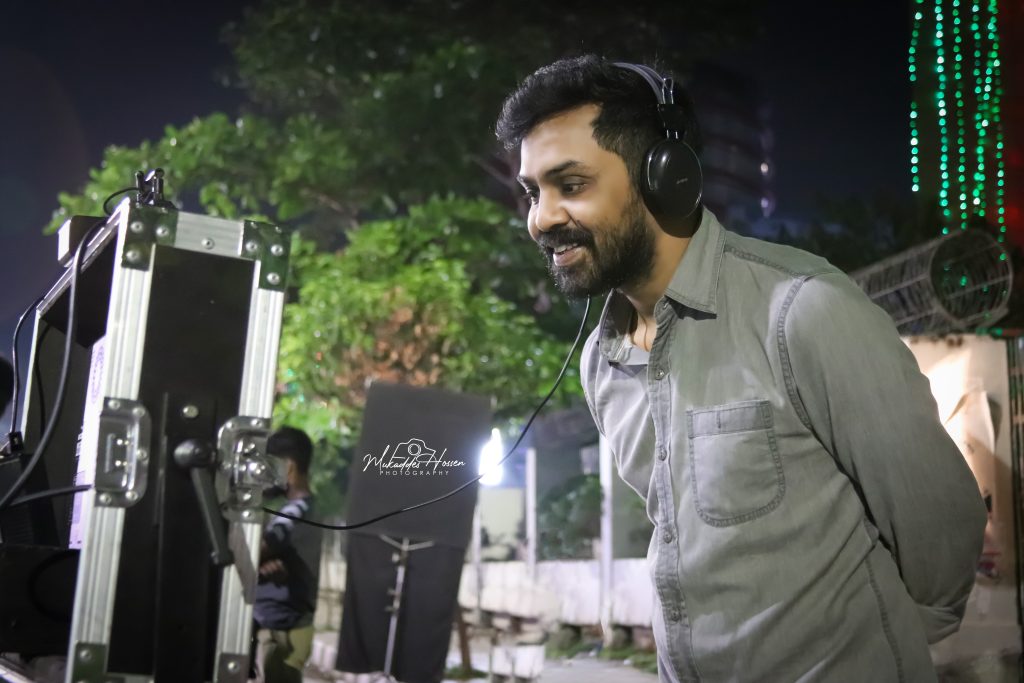
In 2003 Mostofa Sarwar Farooki and Anisul Hoque came to Chittagong to teach a two-day filmmaking and scriptwriting workshop, organized by the renowned Chittagong Film Centre. That workshop changed the course of my life.
Before then not only I watched stories by master filmmakers, but I also saw on television that an alternative form of drama was getting popular, which was telecast on Ekushey Television. Mostofa Sarwar Farooki, Giasuddin Selim, and Nurul Alam Atique used to make those dramas. I saw that stories could be told in this medium as well. The TV dramas were not like the typical dramas of old.
The workshop made me think “This is something I want to do.” The trainers made me feel that this was possible. It is all about telling the story you want to tell. So then it got stuck in my head that I want to join the filmmaking community.
It is quite tough to do filmmaking in Dhaka while living in Chittagong. The next best thing I could do was join the Chittagong Film Centre, as they used to show a lot of foreign films, and used to arrange film festivals. So that is how I kind of got into film festivals.
To answer your question as to when did I exactly decide, subconsciously the decision may have been made a lot earlier when I was young, among art forms, I was most interested in films first, and then music. I did have an interest in poetry, novels, writing, etc. as well, but the art form that stayed with me the most since childhood was cinema. First, there was commercial cinema, and then there were arthouse films. As I gradually grew up and reached the time when I did the workshop, I finally got my calling that “this is what I want to do with my life.” I can tell stories, and I can talk in a fun way during hangouts with friends. If I can tell a story that I have made, and if I can also learn the technicalities of storytelling then why not.
So from that time, I started to mentally prepare to do all the things that are necessary to realize this dream while staying in Chittagong. As I said I joined the Chittagong Film Centre. I watched more films, and I helped organize national film festivals that were held in Chittagong. As I was doing all of this, I grew more determined to leave my home and become a filmmaker.
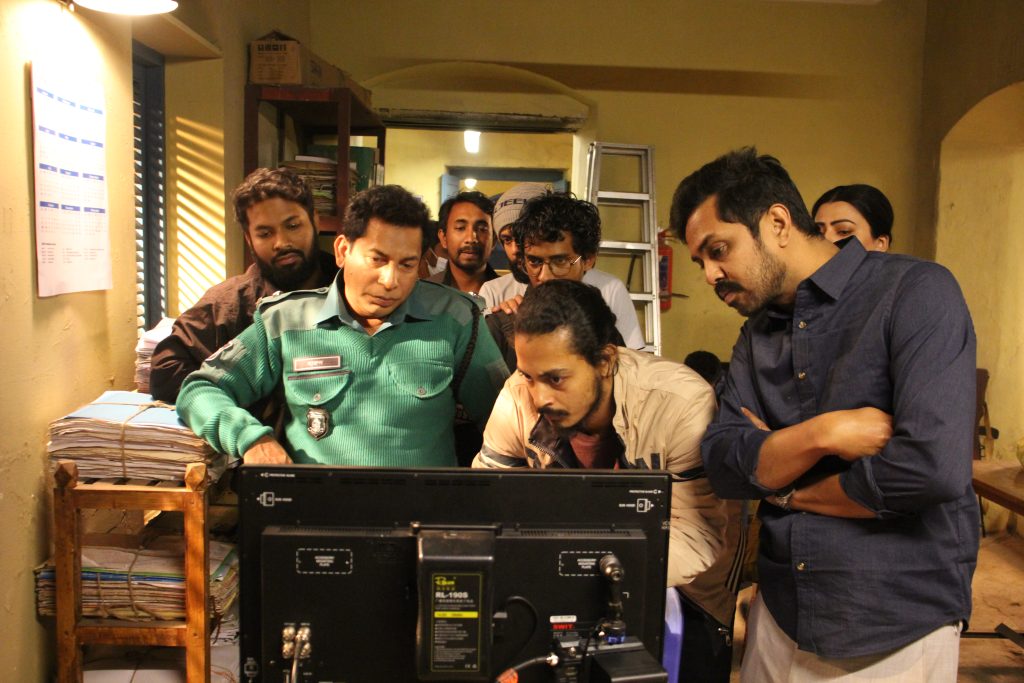
What happened in that filmmaking and scriptwriting workshop?
In any workshop, one thinks that there will be a lot of note-taking, as a lot of technical stuff will be discussed. However, this workshop was different. When Farooki bhai entered the workshop, he had nothing in his hand. There were no papers, notes, chart papers, or anything. There was not even anything hung behind him on the walls. He came in and started chatting with us immediately about how a one-line idea can be turned into a story, and how characters can come out of it. He explained everything verbally and much like he was telling a story.
He did not discuss his films or show any of his films and did not go into the technical aspects at all. He chatted with us about the way seniors and juniors casually hang out together and talk. And that got me hooked. We usually hear that filmmaking is a very difficult art form. No courses were being offered at that time in Bangladesh. To us learning filmmaking was all about learning the different kinds of cinematography and editing with jump shots, close shots or wide-angle shots.
But Mr Farooki focused on stories, characters, and the nature of characters, as to whether they were black or white. He made us think about many different characters and also made us think of people in our respective groups of friends who could be characters in a story.
Anisul Hoque also said the same thing. He said that “I did not study Bangla Literature. I studied in BUET, and from there I turned into an author.” He said all of us who were present there – we were 50 participants in that workshop – can easily become filmmakers, as long as we want it.
Usually, filmmaking workshops were not like this. The trainers of typical filmmaking workshops usually talked about how challenging it is to make films and the challenges of shooting. Sometimes the trainers frightened the participants, by talking about the level of expertise required to make a film, and how difficult it is to reach that level. However, these two gentlemen came and spoke about filmmaking and storytelling in such a casual way, that one would be tempted to think that they too can become a filmmaker overnight. This was at a time when mobile phones were not being used by everyone, let alone smartphones with cameras. So it was not like one could shoot with their camera-phone and make a film like they do now. However, Mr Farooki and Mr Anisul talked more about the storytelling aspect of films.
I was so excited, that I kind of made a small script in my head based on that workshop. This was the feeling they were giving, that anything can be a story. The story does not have to be something impossible. I even thought of an idea that a guy who wants to learn filmmaking came to join a workshop such as this one, but could not join for being late. I thought this could be a short film too.
At the end of the workshop, I naively told Mr Farooki: “One day I will work with you.” He was very friendly and replied “Yeah. Sure, sure. Why not?” I had no idea when I said it at that time that it will happen or not, but as everyone knows it eventually happened, that I started my journey as a filmmaker while working under his tutelage.
I am from a Chittagonian family in which no one has ever worked in media. Before the workshop, when I told anyone that I wanted to be a filmmaker, they used to ask me how will I accomplish it, as I did not know anyone in films. I do not have any artists in the family, and neither did I know any directors. Also, filmmaking is taught abroad. This workshop first made me realize that filmmaking is something I can do.
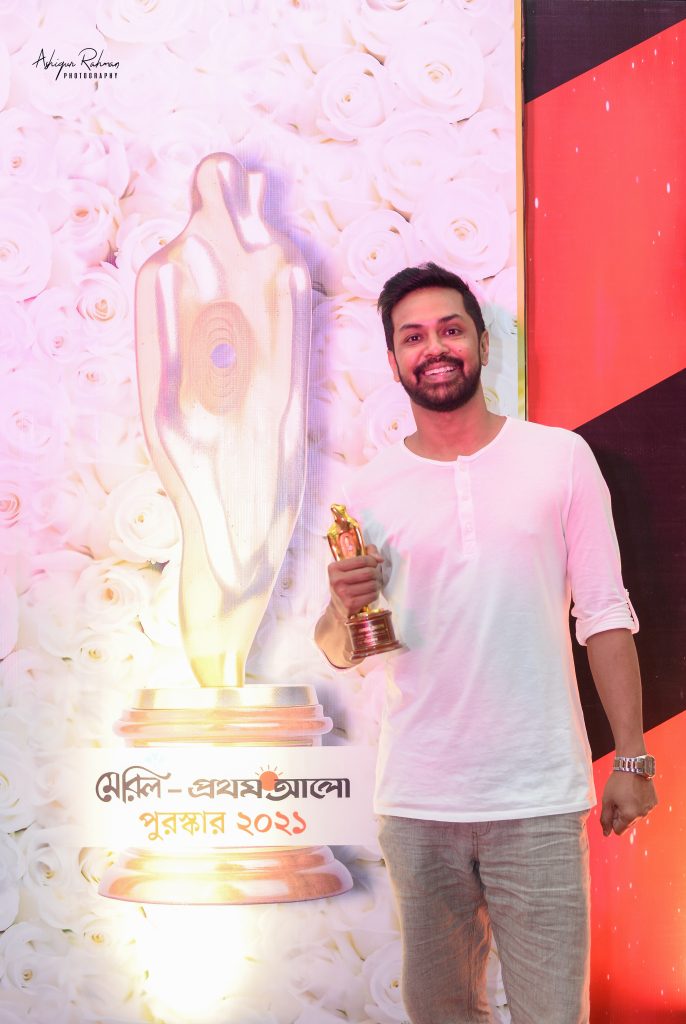
How did you get your start in the entertainment industry?
I had Farooki Bhai’s email address from the workshop, and we began to correspond regularly. I’d send him my reviews on his recent work, and he would always respond, something I think would be impossible for him today in the age of Facebook where one gets thousands of questions every day.
Through the Chittagong Film Centre, I had heard that he would be shooting some of the scenes from his Made in Bangladesh in Chittagong. I wrote to him, asking if I could be involved in any way, volunteering my services.
He graciously accepted the offer, and asked me to help him scout filming locations. This I did, and I was allowed to observe all his processes, and learn from him. I even managed to stand in for one of the actors during the four-day shoot. I tagged along with the team when they went back to Dhaka to shoot the remainder of the scenes. By then I had resolved to become a filmmaker, and this I expressed to Farooki Bhai, who was, by now, familiar with my strong interest in the subject. He offered to find a job for me at an ad agency in Dhaka, where I could learn television before making the transition to film. I said I would rather stay with him and learn from him. Then he said, “Well if you want to dig your own grave then it is up to you.” Then he took me in, and that is how it all started. The year was 2005.
What has the experience been like, while working and learning with Mr Farooki?
The experience was frankly amazing. This was in the year 2005-2006. Farooki bhai was not married then. He was living in a house called Chabial House, and all of his assistant directors, including me, lived in that house with him. Adnan Al Rajeev, Saraf Ahmed Zibon, Redoan Rony, Iftekhar Ahmed Fahmi, Ashutosh Sujon, and all our Chabial contemporaries lived with him. We used to watch films together.
One thing about working with Farooki bhai was that one had to do everything from A to Z in the process of filmmaking. None of the roles or responsibilities were divided among the assistant directors. Back then we did everything by ourselves when it comes to filmmaking, starting from location reconnaissance, script-writing, casting, art direction, costume, and lighting, to all the technical aspects of filmmaking.
Another thing about Farooki bhai is that he used to get ideas out of the blue while filmmaking, such as casting an assistant director in a certain scene all of a sudden or making the same person come up with a story and direct it by themselves. Just like he made me act and direct in my first project 2 in 1.
Do you see yourself acting more in future projects?
Well, the way I learned my craft, I think it depends on the role and requirement of the project. If a film or short film or TV Drama has a role that fits me or a role that I can pull off, I will do it. As I have done so far in my career. If I see that in one of my projects, a role can be pulled off just the way I want it only by me, then I do not mind acting. However, I prefer making films to acting.
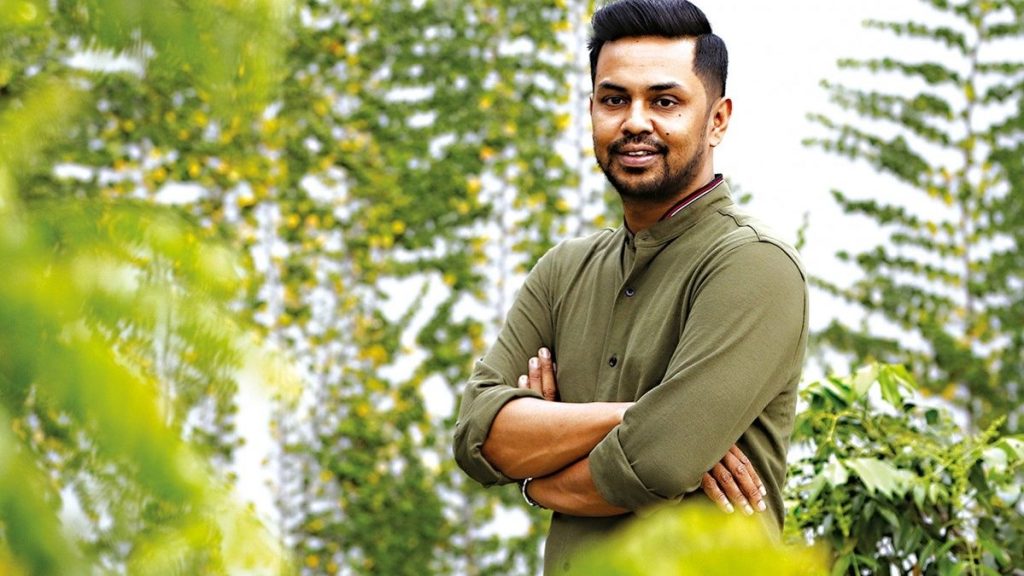
Do you find it comfortable working with a streaming platform more than a TV network?
Well, in one way it is more comfortable, as the streaming platforms give you a lot of freedom. So far I have only worked with Hoichoi, and at first, they did not have much confidence in me, as they want to see regular progress when they green-light a project. Now, I as a director do not like to work with too much planning ahead of time. I finish writing the script on the set, as it constantly goes through editing and revisions, based on what I was seeing during shooting. So during the first project with Hoichoi, the higher-ups of the platform were nervous. However, after I made my first work for them, Koshtoneer, they liked it, and now they give me the freedom to work at my own pace in my way. And the challenge of coming up with something new for the audience of the streaming platform, that will keep them hooked to the screen is something that I love. With TV Dramas there is not much time to tell a story, with the drama having to be between 20 to 30 minutes or 40 minutes. For streaming platform content, I have 200+ minutes to work with, which frees me up to tell the story at a realistic pace.
How did you came up with the script for the Ei Shohore?
There was this news story about a woman who was beaten to death by a mob on suspicion of being a kidnapper. She was proven innocent after her death. I had a wave of anger towards the society that could allow such a thing. Mob lynching is not justified in any way. I guess this kind of visceral hatred stems from frustration in society – of not being able to exercise one’s rights, or suffering from poverty. The script for Ei Shohore came out of that angst.
Why do you think Mohanagar has been so well received?
[The formula for success] is completely subjective to each audience. If we filmmakers knew the ingredients for making a hit show, then we would have always turned out “hit” web series. (laughs). For Mohanagar I can give the example that people saw something different. The entire story is set in one night. Even the great actor Prosenjit Chatterjee called me and told me that he loved the concept of making a series with the events that happen in one night.
I think for a long time we used to take our audiences for granted. We as filmmakers used to try to cover our limitations by saying “This is what the audience wants, so let us just make this.” Whatever is trending, let us just make that on a small budget. However, our audience is very sharp and can judge the quality of our work.
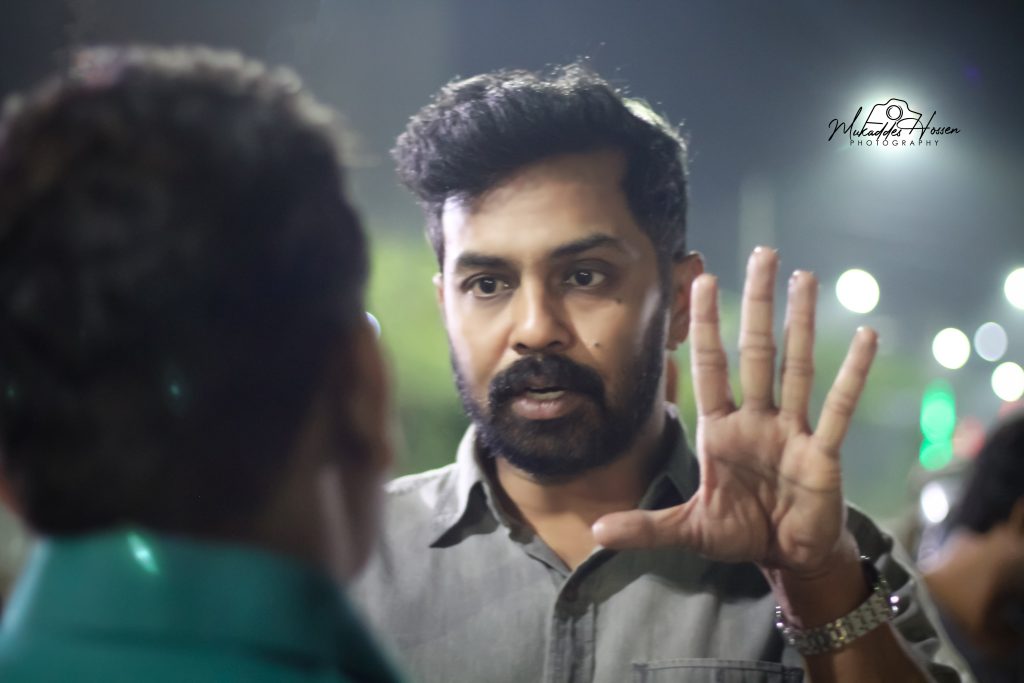
In India, there are subscriptions for each network of channels. So a person could subscribe to either Sony or Zee or Star network or a combination of each by paying the required subscription fees. There was this one show called Kapil Sharma Show, which did so well that other channels started making similar shows to ensure that they do not miss out on subscribers. That is not something we have in Bangladesh.
Our audiences were being taken for granted by the TV channels here. When streaming platforms came, since it runs on the subscription model, the audience started demanding more quality content. People do not want subpar content when they are paying more money for them. To ensure quality, Bangladeshi directors of streaming platforms such as Shawki, Amitabh Reza Chowdhury, Tanim Noor, myself, and many others felt that there is no alternative besides coming up with a story that glues the audience to the web series. Something they have not seen before.
Mohanagar comes from that intention, the story of what can happen in a police station in the space of one night – six hours. This is something that was never shown on our TV before. Not many books have been written about this experience. Everyone is a little afraid of police stations.
So we have to give something new to the audience. We have to tell a Bangladeshi story but in a new style. In TV star cast matters, as in, you can get away with casting the most popular and trending actors. However, the audience of streaming platforms spends money and a lot of time watching the content – 200+ minutes, which is a big amount of time.
You also need a philosophy behind the work. You need to show why the story is relevant. Why you are telling the stories?
Therefore, newness in the story, newness in storytelling, and the philosophy behind the work are the ingredients for making a web series successful. As long as you are honest about these issues, your content will work.
What’s next for Ashfaque Nipun?
I will be working on my feature-length film. The script is ready and the work will begin this year. Aside from that, I have two or three web series in the works. Let us see what the future holds.




